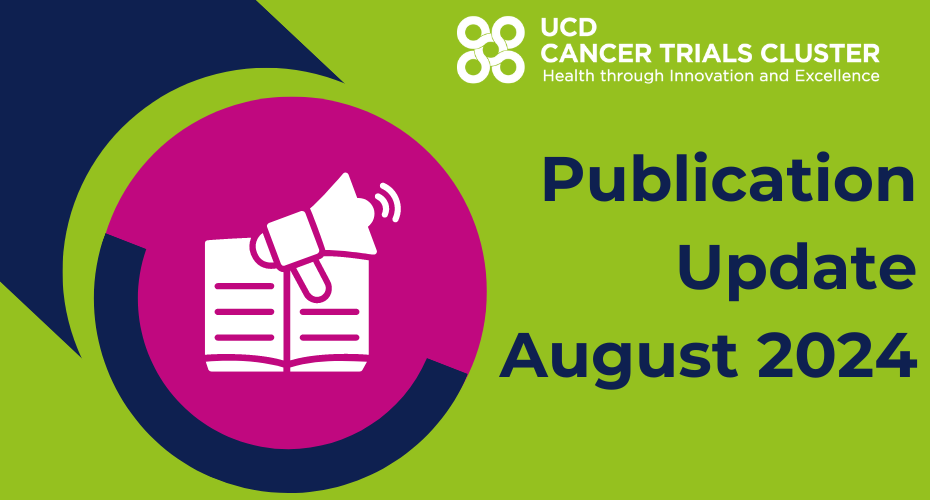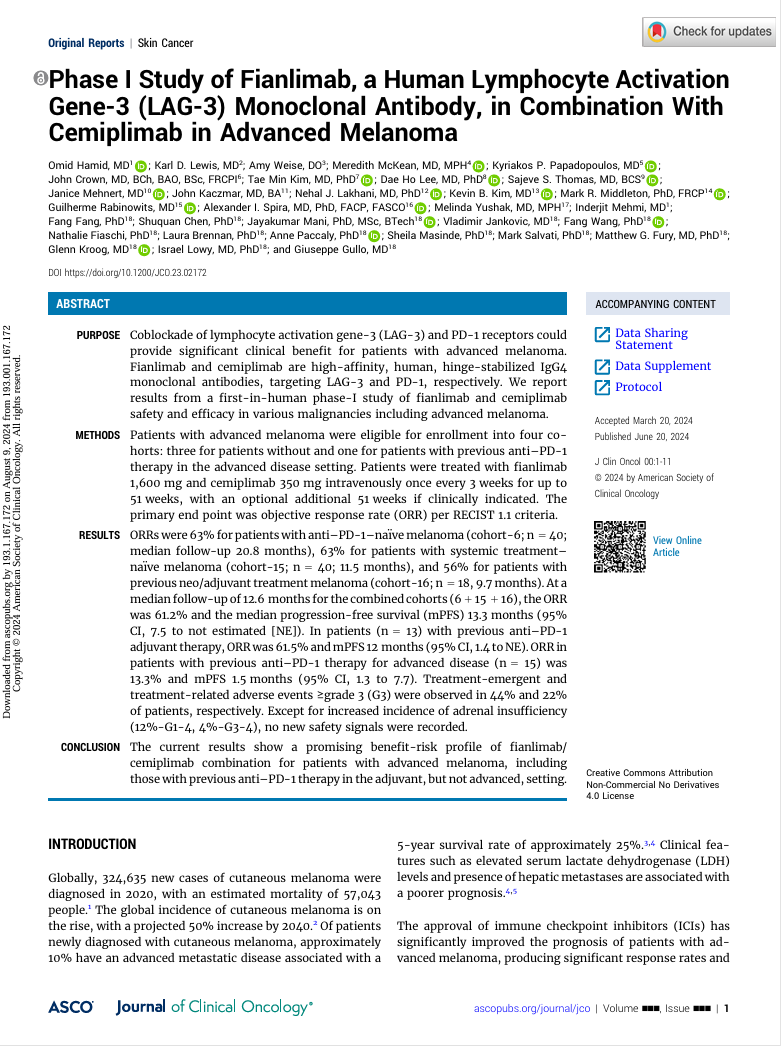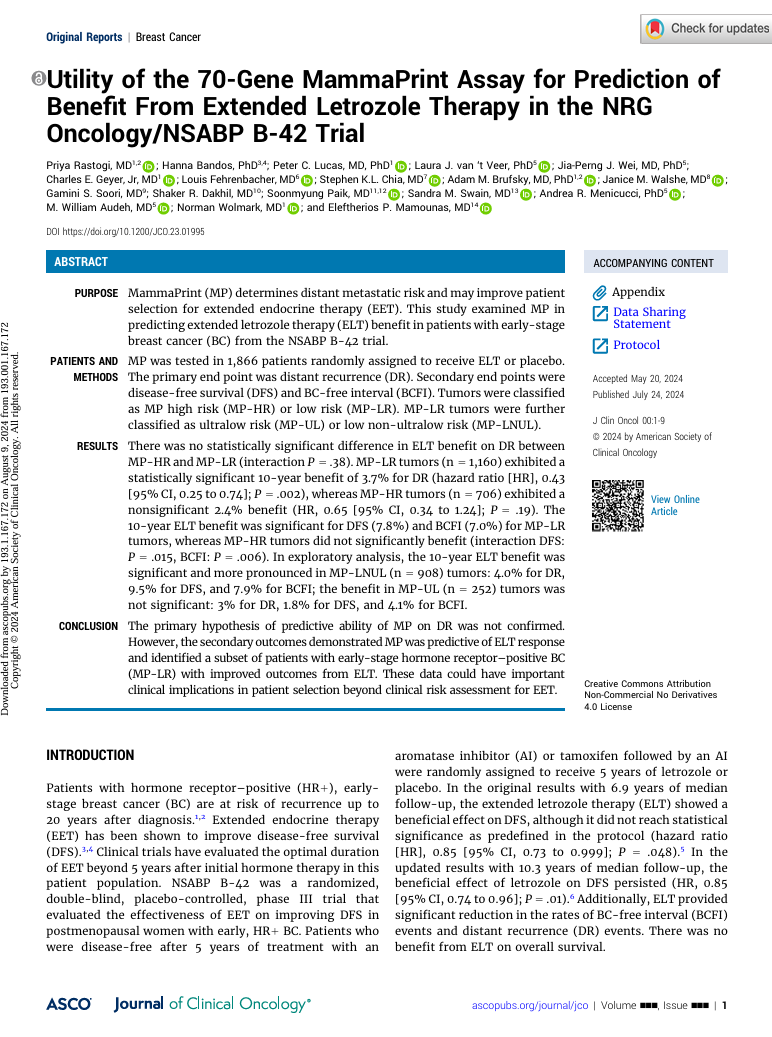Wednesday, 14 August, 2024
August Publications Update from the UCD Cancer Trials Cluster

The publication of peer-reviewed articles is an important step in the research process. Not only does it communicate new findings in cancer research, it allows research to be subjected to independent expert review.
Our researchers and collaborators have been busy publishing their research. Below we summarise just three of the 40+ publications that have been released this year so far.
If you would like to read more of the research produced by the UCD Cancer Trials Cluster's researchers and trial units, you can find our publication list on our 'what we do' page here.

1. Phase 1 Study of Fianlimab, a Human Lymphocyte Activation Gene-3 (LAG-3) Monoclonal Antibody, in Combination With Cemiplimab in Advanced Melanoma
(opens in a new window)Link to article
Over 300,000 people are diagnosed with melanoma globally each year, of which, 1 in 10 are diagnosed with advanced metastatic disease.
This study explores the safety and effectiveness of a new combination therapy using fianlimab and cemiplimab for treating advanced melanoma. Fianlimab targets LAG-3, a protein that helps cancer cells evade the immune system, while cemiplimab targets PD-1, another protein involved in immune suppression. By blocking both LAG-3 and PD-1, this combination aims to enhance the body's ability to fight cancer.
In this Phase I clinical trial, patients were divided into groups based on their previous treatments and received the combination therapy every three weeks. The results showed a promising overall response rate of about 61% in patients who had not previously been treated with anti-PD-1 therapy, meaning their tumours significantly shrank or disappeared. For those who had previous treatment, the response was lower, especially in patients who had already received advanced anti-PD-1 therapy
The median progression-free survival —the time during which the cancer did not worsen—was 13.3 months for most patients. The treatment was generally well-tolerated, with some patients experiencing side effects, including adrenal insufficiency.
Overall, this study suggests that the fianlimab and cemiplimab combination is a promising treatment option for advanced melanoma, particularly for those who have not received prior advanced therapies. However, more research is needed to confirm these findings.
2. Palbociclib combined with endocrine treatment in hormone receptorpositive, HER2-negative breast cancer patients with high relapse risk after neoadjuvant chemotherapy: subgroup analyses of premenopausal patients in PENELOPE-B
(opens in a new window)Link to article
This study investigates the impact of adding the drug palbociclib to standard endocrine therapy endocrine therapy in pre-menopausal women with hormone receptor-positive, HER2-negative breast cancer at high risk of relapse after chemotherapy. The research focuses on whether this combination improves invasive disease-free survival, which is the time patients remain free from invasive cancer after treatment.
The PENELOPE-B trial included 616 pre-menopausal women out of 1,250 total participants. They were randomly assigned to receive either palbociclib plus endocrine therapy or a placebo plus endocrine therapy. The results showed no significant difference in invasive disease-free survival between the two groups. However, a slight improvement was noted in patients who received palbociclib, especially when combined with ovarian function suppression and tamoxifen, a common ET drug.
The study also examined the safety of palbociclib, noting that it led to more frequent blood-related side effects but did not negatively impact ovarian function during the treatment period. This is important for fertility considerations in younger women.
In summary, adding palbociclib to endocrine therapy may offer some benefits in reducing cancer recurrence in specific premenopausal patients, particularly when combined with ovarian function suppression, but it does not significantly improve overall survival rates. The treatment is generally safe, with manageable side effects.

3. Utility of the 70-Gene MammaPrint Assay for Prediction of Benefit From Extended Letrozole Therapy in the NRG Oncology/NSABP B-42 Trial
(opens in a new window)Link to article
Patients with hormone receptor-positive (HR+), early-stage breast cancer are at risk of recurrence for up to 20 years after diagnosis. The NSABP B-42 trial studied whether continuing endocrine therapy for an additional five years with letrozole could improve outcomes for postmenopausal women who had already completed five years of treatment. Initial results showed a modest improvement in disease-free survival, which became more pronounced after ten years of follow-up, reducing the risk of breast cancer returning or spreading.
While extended letrozole therapy offers modest benefits in reducing breast cancer recurrence, it's unclear who truly benefits. The 70-gene MammaPrint test can classify tumours by recurrence risk, helping to identify patients who might benefit from extended letrozole therapy and those who could avoid unnecessary treatment and side effects.
MammaPrint was tested in 1,866 patients, who were assigned to receive either extended letrozole therapy or a placebo. Patients’ tumours were classified as high risk or low risk.
This report shows there was no difference in benefit of extended letrozole therapy on recurrence between women whose tumours scored high risk versus low risk on the MammaPrint assay. As such, scores on the MammaPrint test cannot be used to determine who should receive shorter or longer durations of endocrine therapy.